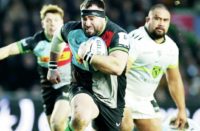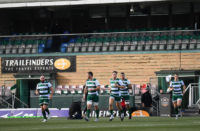 Wayne Smith is hardwired with the All Black genome from the soles of his feet to the last hair on his head. Having won 17 caps at fly-half for New Zealand from 1980 to 1985 – including the whitewash of the 1983 Lions – he moved into coaching, with an illustrious career reaching a pinnacle when New Zealand won the World Cup for the second time in 2011.
Wayne Smith is hardwired with the All Black genome from the soles of his feet to the last hair on his head. Having won 17 caps at fly-half for New Zealand from 1980 to 1985 – including the whitewash of the 1983 Lions – he moved into coaching, with an illustrious career reaching a pinnacle when New Zealand won the World Cup for the second time in 2011.
After that triumph on home soil, Graham Henry, nominally ahead of him in the All Black pecking order – even though Smith had preceded him as New Zealand head coach (2000-2001) – described his assistant like this:
“Wayne is the best coach I have ever coached with.” That is praise indeed, because Henry is not known to be lavish with superlatives.
However, with Smith having helped the Chiefs to two consecutive Super 15 titles as their technical adviser since stepping down from the World Cup winner's rostrum, he has lived up to Henry's billing. His ability to sprinkle gold dust wherever he goes is undiminished, and the Chiefs successes mirror the two Super 12 titles he won as Crusaders coach in 1998 and 1999.
Smith, right, is a coaches' coach, one who has done the hard yards as an elite player, and then as an instructor and mentor to consistently the best team on the planet.
Smith is currently in Europe to take in some of the autumn action, and he offers us a unique insight into Wayne's world. This includes why he expects New Zealand to remain as international rugby's apex predator right up until they defend their world champion status by trying to become the first team to win back-to-back World Cups in England 2015.
In the process he spotlights the rigorous standards that sets the All Black culture apart from its rivals, including some pointed criticisms of Australia (see panel below). Smith also reveals the tactical trail-blazing – especially in honing their counter-attack – that has taken New Zealand through two nearly unbeaten seasons since their World Cup victory over France in Auckland.
New Zealand's only defeat in 26 Tests over that period came against England last season, when they were ambushed 38-21 at Twickenham. Smith says it is a victory he does not see Stuart Lancaster's side repeating when they meet again on Saturday. Here's why.
“You can only go on current form, and to me that will be the All Blacks. England will improve over two weeks, and they will be hungry, but New Zealand are playing better than last year and will be pretty driven to finish on an unbeaten season.”
Smith argues that New Zealand have improved since winning the World Cup, and makes the observation: “They've tried to take their game to a higher level by getting really quick attacking ball.”
He moves on to emphasise the importance of defence and counter-attacking, the areas in which, his track-record tells us, he is the best specialist in the game – and where the All Blacks excel.
New Zealand's punishing of opposition mistakes is brutal. So, is counter-attack seen as the mother lode to be mined with more care and attention than anything else in the All Black camp?
“It's emphasised in terms of importance. When I moved to All Black defence coach (from being backs coach) my new job was defence and counter-attack, because they are so linked. If 45 per cent of tries come from counter-attack – and it is at least that amount – then 45 per cent of your training should be for that. If that percentage of tries comes off opposition ball, whether it's from kicks, tackle turnovers, or handling mistakes, then you have to pay it that amount of attention and focus.”
Smith says it is about attitude of mind, and seeing attack less as a risk and more as the most rewarding way of playing our sport. “Even up here in the North, the counter-attack stats are similar to those in the Southern Hemisphere. But you can only have that mindset if you understand that when there is instability in the game, if you can become more stable more quickly than the opposition, then there are scoring opportunities.”
Smith believes this attitude is at the heart of the inexorable drive for higher standards in New Zealand rugby.
“There is a desire to take the game to another level, and you have coaches who are not afraid of losing in order to get there. It sounds paradoxical, but New Zealand play as much (attacking) rugby as they can because their attitude is that if we do, then no-one will be able to live with us. Steve Hansen doesn't want to sit still, he wants the team to improve.”

Smith says that the current All Blacks play with a freedom that his generation never had: “It's all about accuracy in terms of catching, passing, and putting players into space. It's a different, refreshing attitude – and it has altered from my playing days for New Zealand. When I played there was a real fear of losing, so we often won ugly, whereas this team plays so hard and fast that it takes it beyond other teams.”
He acknowledges that to play that way it is important to have footballers in every position, including the front five of the pack.
“In the past props never used to talk about the result, only what happened at the scrums. These days the All Black props don't just want to play in scrums, they want to be part of the result – and they work harder than virtually every player on the pitch to achieve it.”
Smith says that the desire ‘to play' is now embedded deep in the All Black psyche: “Attack is a mood – it is an optimism that pervades the team. It means that as soon as they see an opportunity to attack, they'll take it from wherever it is on the pitch. The first thing is to get the mindset right, and then the skills. Everyone knows you have to get low to clear bodies, but you also have to have the courage, the fitness, and the skill set to play the way they do.”
Smith says that when they take on England at Twickenham this weekend the All Blacks will be focused more on their ability to reach those goals than being on a revenge mission for last year's loss.
“They are not hugely emotional, and do not hold grudges. Revenge is a bit of a waste of mental effort. It becomes a distraction. Knowing them they will aim to play their game and do their tasks well.”
Smith was a spectator at Twickenham to see England play Australia, and he does not discount England being capable of playing the almost error-free pressure rugby they produced last year against New Zealand again.
“They are eminently capable of it, and I'm sure they will be focused and competitive. Also, beating an Australian team with something in hand, and the way they did not celebrate at the end – like they would have in the past – was a bit chilling for Australia.”

However, Smith does not hold back from constructive criticism of Lancaster's team, despite their win. “Last weekend was interesting, but it was also a pretty flat game which lacked magic and intensity. Set against that, Stu (Lancaster) had a lot of players out – like Corbisiero, Parling, Barritt and Tuilagi – so he tried new combinations, and it didn't all gel.”
His view is that the England backline is still missing a trick or two, with Owen Farrell's positioning the first hitch to be straightened out. “The fly-half (Farrell) plays pretty deep, and even his try was from deep against a very poor defence.”
He notes that a midfield minus Manu Tuilagi and Brad Barritt is less effective, and that the England back three is not as incisive a counter-attacking unit as it could be.
“Attack is not founded on one person, but Tuilagi is a hell of an athlete. This time England do not have a midfield combination like that Barritt-Tuilagi partnership, because, while they are both good players (Twelvetrees and Tomkins), they are not a combo.”
He adds: “Mike Brown is a very good full-back, but they do not get back to help him. You need a well-honed system to counter-attack, and it wasn't there. England relied mainly on their forwards to get penalties at the set-piece, and the backs did not get much cohesion.”
Smith concludes: “The big question is whether England can get quick ball, and do so in the short time they have to prepare for New Zealand. However, that win over Australia so early in the season has proved England are worthy of third place in the IRB world rankings.”
Ask Smith if England can, or should, play like New Zealand and he says they have been there already, because he witnessed it during his three-year stint with Northampton.
“From 2001 to 2003 England out-New Zealanded New Zealand. They were the best team in the world, and at Northampton we tried to play like England – which was not easy, because it was a fantastic brand of rugby, with Ben Cohen receiving more ball than any other wing in the world.”
Looking ahead to the World Cup, Smith says English rugby has grounds for optimism, even though they will be playing catch-up with New Zealand: “There are a lot of good players available to England, and Lancaster will have a different team from this autumn when it comes to the crunch in the World Cup. He will also have more depth. However, you are also talking about matching an All Black team that will have played this way for years.”
Smith contends that the unified system in New Zealand has helped Hansen to avoid the post-World Cup slump experienced, most notably, by England in 2003.
“One of the reasons we have been able to keep most of our players in New Zealand is because they play more for love than money. There's certainly been a huge drive for the team to prove themselves as world champions. Expectations in New Zealand are so high, and this team is determined to counter the dip between World Cups. Players like Richie McCaw, Dan Carter and Conrad Smith wanted to drive the standards higher.
“In the All Blacks there is dual management, with the coaches and the players working together. They have also kept a number of players with a massive number of Tests under their belts – McCaw, Carter, Conrad Smith, Ma'a Nonu, Andrew Hore, Tony Woodcock, Keven Mealamu – who have been through tough times as well as good.
“You also have coachability from the players – and that is helped by 100 or more years of similar standards. Other teams have dropped off, but not the All Blacks. They have been smart about bringing in new players to the fold, and not throwing them to the wolves. They have brought in a lot of youth, but in between experienced combinations, so, for example, when (inside centre) Francis Saili was selected it was with Dan Carter inside him and Conrad Smith on his outside.”
Smith believes that the depth they have developed means New Zealand could retain their world title even if they lost talismanic players like McCaw and Carter.
“There is depth in those positions with Sam Cane and Aaron Cruden coming through. Of course they can retain the World Cup, but it won't be easy. It is 12 Tests in 14 weeks after the Rugby Championship, and that is very fatiguing.”
Ask Smith about whether he distrusts the hype surrounding the All Blacks, from both outside and inside New Zealand, and his answer is upbeat.
“The All Blacks don't get carried away with the praise – they take it with a grain of salt. I like the fact that Rugby Union is talked about a lot, and being World Cup winners is fantastic. It's given the team confidence and given people in New Zealand a sense of fulfilment. They are not as ready to bag the All Blacks – although that will change quickly enough if they don't win the next game.”
It also confirms why, for Smith and the All Blacks, excellence is the name of the game.
Wayne Smith is an ambassador for www.therugbysite.com which delivers the world's best playing and coaching videos from leading experts including Graham Henry, Warren Gatland, Victor Matfield, Sam Warburton, Dan Carter, Richie McCaw, Leigh Halfpenny and Bismarck du Plessis.
*Wayne Smith is one of 19 world leading rugby coaches and players on www.therugbysite.com. Other contributors include Warren Gatland, Josef Schmidt, Graham Henry, Richie McCaw, Sam Warburton, Leigh Halfpenny and Dan Carter, to name a few.
As well as HD coaching videos, The Rugby Site includes blog content from our coaches and a team of top journalists. Visit www.therugbysite.com to find out how your club, school or union can learn from the best minds in rugby.


























